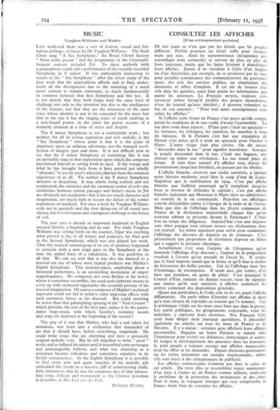MUSIC
Vaughan Williams and Mahler
LAST week-end there was a sort of festival, casual and for- tuitous perhaps, of music by Dr. Vaughan Williams. The Bach Choir sang " A Sea Symphony," the Royal Choral Society " Dona nobis pacem " and the programme of the Courtauld- Sargent concert included job. To these anybody with a gramophone could add a performance of the recently recorded Symphony in F minor. It was particularly interesting to return to the " Sea Symphony " after the closer study of the later work that the gramophone affords and to find, under- neath all the divergencies due to the maturing of a mind never content to remain stationary, so much fundamentally in common between that first Symphony and this last. It is not merely that they both begin with the same kind of challenge not only to the attention but also to the intelligence of the listener, nor that they arc the utterances of the same voice whose identity is not to be concealed by the mere fact that in the one it has the ringing tones of youth exulting in a new-found power, in the other the graver accents of a maturity attained at a time of stress and despair.
The F minor Symphony is not a comfortable work ; but neither, for all its joyous aspiration and rich melody, is the " Sea Symphony " whose point is that it is the point of departure upon an arduous adventure, not the tranquil recol- lection of dangers past and done. It is not difficult now to see that the F minor Symphony or something like it was an inevitable stage in that exploration upon which the composer proclaimed himself as setting forth in 191o. If the voyage and what he has brought back from it have proved not wholly "pleasant," to use his poet's adjective, that has been the common experience of us all. Yet neither is the F minor Symphony defeatist or despairing. It may admit, being realistic and not sentimental, the existence and the enormous power of evil—the similarities between certain passages and Satan's music in Job are obviously not accidental—but it has too much character and imagination, too much faith to accept the defeat of the nobler aspirations of mankind. For once a work by Vaughan Williams ends not in quietude and the slow dying-out of all sound into silence, but in a strenuous and courageous challenge to the forces
• of evil.
The year 1910 is already an important landmark in English musical history, a beginning and an end. For while Vaughan Williams was setting forth on his journey, Elgar was reaching what proved to be, to all intents and purposes, his final goal in the Second Symphony, which was also played last week. That this musical summing-up of an era of opulence happened to coincide with a new reign gave to the Symphony at the time the added force of a valediction. It was good-bye to all that. We can see now that it was also the farewell to a musical era one of whose most typical products was Mahler's Eighth Symphony. This monster-piece, employing about a thousand performers, is an astonishing monument of empty magniloquence. No composer, not even Berlioz at his worst, whom it sometimes resembles, has used such elaborate means to cover up with orchestral ingenuities the essential poverty of his musical imagination. Of course a composer of Mahler's technical ingenuity could not fail to achieve some imposing effects with such enormous forces at his disposal. But could anything be worse than that galumphing opening of the " Veni Creator " which provides the text of the first part, unless it be the panto- mime bogy-music with which Goethe's romantic woods and crags are depicted at the beginning of the second ?
The pity of it was that Mahler, who had a real talent for miniature, was born into a civilisation that demanded of art that it should have, before everything, magnitude. He could write songs that are charming and have a genuinely original melodic vein. But he felt impelled to write " great " works and so inflated his talent until it resembled some grotesque and unmanageable balloon, and what was charming as a miniature became ridiculous and sometimes repulsive in its fleshly sensuousness. In the Eighth Symphony it is possible to find every now and again snatches of his melodic gift embedded like fossils in a massive cliff of uninteresting chalk, little intimations that he was the composer also of that miracu- lous song, delicate and transparent as the Chinese porcelain it describes, in Das Lied von der Erdc.
DYN'ELEY HUSSEY.


















































 Previous page
Previous page